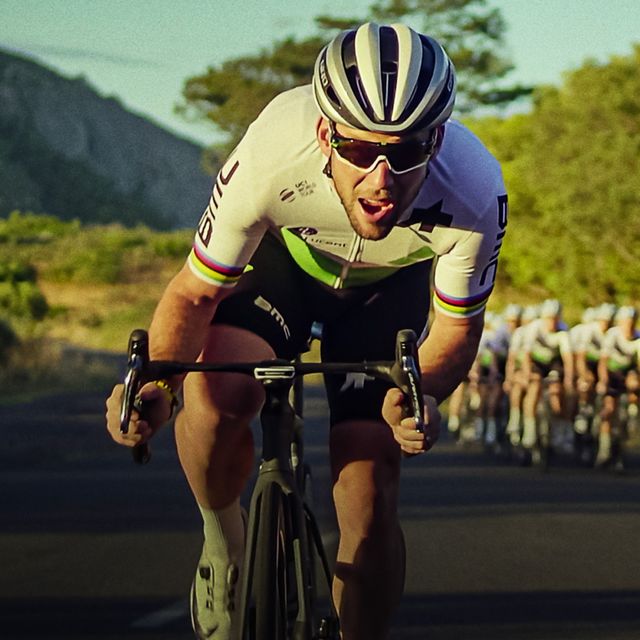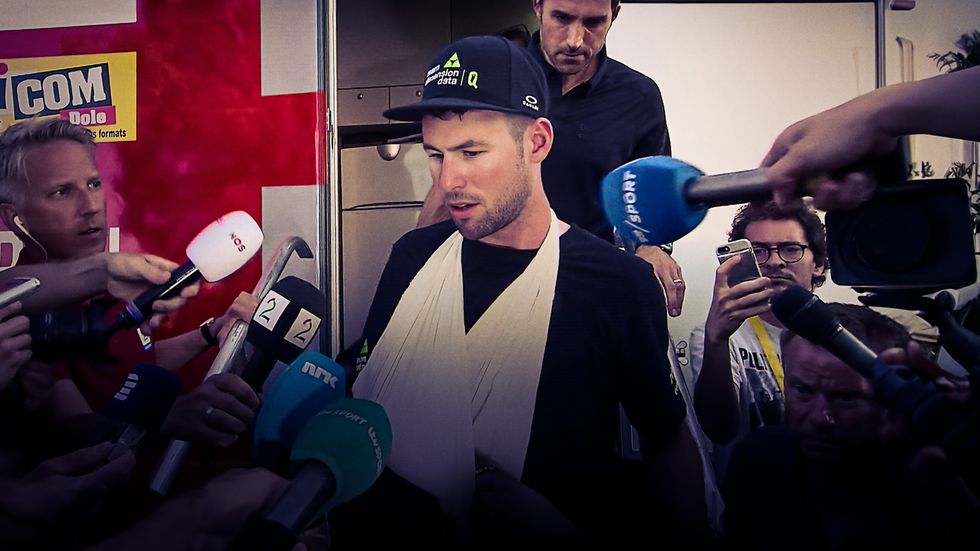The Netflix sports spotlight falls on the world of competitive cycling with a documentary all about Mark Cavendish, the celebrated British athlete who has been referred to as “the most wiliest, most effective and most exciting cyclist ever.”
Mark Cavendish: Never Enough follows the man himself, his wife Peta, as well as his coaches and teammates from 2017 to 2021, as he attempted to equal Eddy Merckx’s record of 34 stage wins but found himself battling injury, illness and depression. His resilience is put to the test in what ends up being an incredibly inspiring comeback, one that will go down in sporting history.
So what was his journey to get him there?
The backstory
Cavendish was born in Douglas, the Isle of Man, in 1985, and began riding on a BMX as a child. Aged 9, he joined a local bike racing club, and a coach referenced his early determination to the BBC back in 2012: “He didn't like losing. He started to win and often he would lap the other riders in the field”.
Upon receiving a mountain bike on his 13th birthday, he met the professional cyclist David Millar, who inspired him to train towards becoming a pro.
In 2003, he was almost rejected from the British Cycling's Olympic Academy junior team as he hadn’t performed well in the stationary bike tests, but after his coaches appealed, he was later included. He went on to win his first win in a senior competition in 2004. A year later, he won gold at track world championships in Los Angeles with partner Rob Hayles. He also won the European Championship points race.
Turning Pro
In 2005, he turned pro and became part of Team Sparkasse, riding in tours such as Tour De Berlin, The Tour of Britain and at the 2006 Commonwealth Games in Melbourne.
In 2006, he moved over to the T-Mobile team, where he stayed until 2011 and rode to victory at the 2007 Scheldeprijs in Brussels, as well as various stages of other global races.
But in the 2008 Olympics, he failed to win a predicted gold medal with his then partner, Bradley Wiggins. Speaking to the Guardian in 2008, Wiggins revealed that the pair didn’t speak for a time after the fall-out at the games: “Cav is like my little brother and I love him dearly. But we left the stadium without saying a word to each other and we've yet to speak. We should have been good enough to win the madison but in the past I've always been the leader so it was weird when the roles were reversed.”
Cavendish’s riding style has been called “aggressive” and after stage four of the 2010 Tour de Suisse, Cavendish was involved in a crash with Heinrich Haussler during the end of the sprint stage. Haussler and two other cyclists quit the race because of their injuries (though Cavendish was able to continue) and Cavendish was landed with a 30-second penalty and a fine of CHF200 fine (£159) as a result.
He also suffered from an infection in his gum in 2010, after getting cosmetic surgery on his teeth. This resulted in a fever, which impacted on his performance. Still, a year later he took home another accolade – this time off-track, as he won the BBC Sports Personality Of The Year.
After concentrating on the Tours, Cavendish didn’t compete on a sports track again until 2015, when he teamed up with Wiggins and won his third UCI Track Cycling World Championships title in the madison. He went on to get a silver medal in the omnium at the 2016 Summer Olympics.
However, in the same Olympics, Cavendish was forced to apologise to South Korean cyclist Park Sang-hoon after he crashed into him in a race. Park was thrown from his bike, rendering him unconscious.
According to the Telegraph, at a press conference in London, he said: “When journalists at the Tour de France ask me if I am the best sprinter, I answer 'Yes', and that's seen as arrogance, but if they don't ask me, I don't say I'm the best sprinter in the world.”
Cavendish was diagnosed with Epstein–Barr virus in April 2017, which led to months out of action. However, he rallied and was back in the saddle by the end of the year to race in the Tour de France. But In August 2018, he was diagnosed with the virus a second time and took time off to recover, and it affected his mental health, leading to depression.
When he did race, he suffered from injuries, and in 2018 he was hit by a succession of them: an injured shoulder, fractured rib, bruising and abrasions, as well as a possible ankle ligament injury. He withdrew from races, calling it “incredibly disappointing”.
By 2021 things looked like they were on the up, and he won stages 2, 3, 4 and 8 of the Tour of Turkey, but in Ghent he crashed, suffering broken ribs and a punctured lung. Off the track, he was robbed at knifepoint by two masked men at his Essex home, with his wife and children in the house. The two men were later jailed.
Where does he stand now, in all-time ranking?
At the time of writing, Cavendish has won 34 Tour de France stages, making him joint first on the all-time list together with Eddy Merckx, who he made it his mission to beat. He also has 54 Grand Tour stage victories to his name, making him third on the all-time list, and his 162 professional victories rank him joint second of all time.
Mark Cavendish: Never Enough streams on Netflix from August 2.















